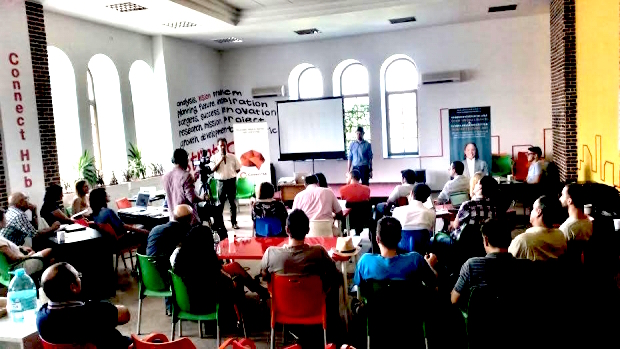In 2012, Dragos Roua launched an event called Open Connect. Using Starbucks as a platform, Dragos transformed the coffee shop into an environment that nurtured connection, where individuals could communicate and give feedback to one another. According to Dragos, this type of environment was missing in Romania, and this was an attempt to change the scene.
Yet, even though the coworking structure was pretty much non-existent at the time, a lot of people showed up, leading to 4 more years of meet ups and eventually in 2014, Connect Hub was born. We caught up with Dragos to learn more about Romania’s coworking growth.
Hi, Dragos. Please tell us a bit more about the story of the initial meet up leading to the birth of Connect Hub.
When I launched the first event in 2012, I wanted to create an environment where people would easily give feedback to each other, something which was lacking at that time in the online scene and, to some extent, still is. To my surprise, a bunch of people showed up, and over the last 4 years, a community of more than 5000 people grew around the event.
In addition to a community, a lot of business started to happen between them, from partnerships, clients exchange, service exchange. It was a vibrant community and in 2014 2 angel investors helped us to make Connect Hub a reality. Today, the coworking space has grown beyond the initial community, although we still have Open Connects each Thursday.
What are some of your other projects you are working on connected to the space?
I have written a book, titled: “Being A Digital Nomad“, which tells the story of Open Connect.
How familiar are people with coworking spaces in Romania?
Connect Hub was actually the third coworking space in Bucharest to open and since 2014 at least 10 more have opened.
Did people embrace the concept ? Or were there some challenges in the beginning?
I would say the concept was very well received. The first hub was opened in 2009, but it wasn’t until 2012 that things really picked up, so it took some time.

Dragos Roua, Connect Hub
What kind of community do you foster?
We are a generalist hub. Everybody who has a business can come to work and enjoy the community. We have e-commerce consultants, public speaking coaches, raw vegan fast food owners, programmers, web designers, marketers, professional photographers.
Would you say that Connect Hub played a role in changing people’s opinions about coworking in the region?
Coworking was already a reality when Connect Hub launched. Our presence may have been accelerated the adoption of the phenomenon and also contributed to the launch of other, more specialized, hubs.
Are there more spaces popping up and do you yourself collaborate with them?
Yes, we have many hubs opening. Although because of the hype, the concept was somehow diluted. For example, if you have some office space to rent, then it is understood as being cool to name yourself a “hub”. But, sometimes we do collaborate with other coworking spaces.
If so, what are some of your projects that involve connecting the Romanian community with the greater European one?
There is a Romanian Association of Coworking Spaces in the works right now, and Connect Hub is one of the co-founders of that association. Things are moving a bit slow at the moment, but eventually, we’ll get there.
Are there any specific struggles in Romania, economically and socially that coworking can help to alleviate? Can you give some examples, if so?
As a matter of fact, Romania had the highest GDP growth in Europe, which was at 5% in 2016 and it’s expected to keep that position in 2017 as well, with a 3.2% growth.
But, coworking is still in its nascent stages, so there is a lot of room to grow. There is potential for many wonderful things to happen, and the most important among them may be the apparition of the first real incubation / acceleration programs centered around the reality of Romanian economy and culture.
Is there an increasing freelance population in Romania? If so, why do you think that is and do you think it is positive?
Yes, freelancing is becoming quite popular. While I salute the trend, I don’t see it necessarily as a good thing, because I am more interested in the next level of freelancing, which is entrepreneurship. We’re still experiencing a lot of short-comings in this area, as freelancing is not very conducive to economic growth in the long term in the way that entrepreneurship can be.
Currently, the mindset is still frozen, and that is something that has to change in the coming years.
Has coworking in Romania helped other business sectors improve/become more innovative, such as real estate?
Not necessarily real estate, but for consultants, it has been an interesting and innovative way to expand their business.

